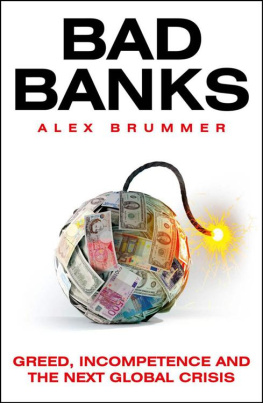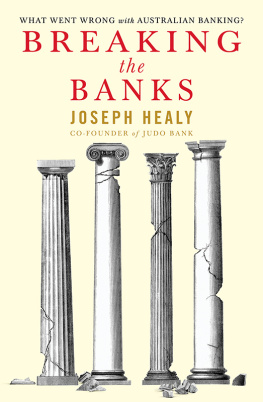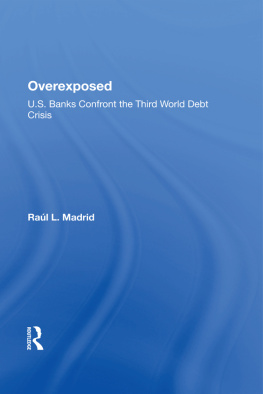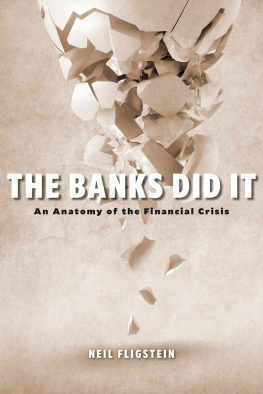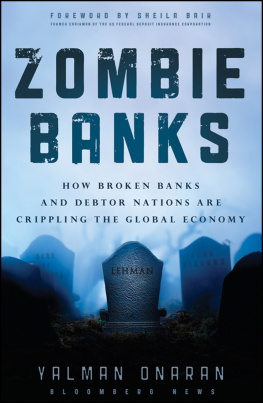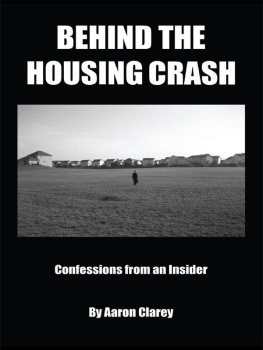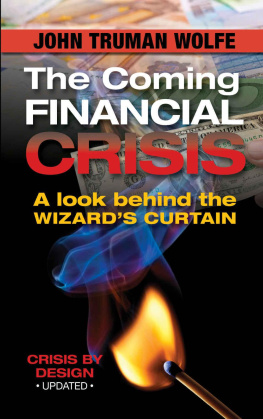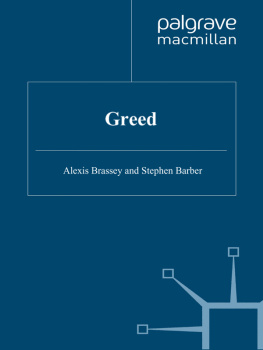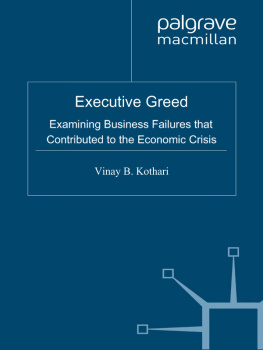Brummer - Bad Banks: Greed, Incompetence and the Next Global Crisis
Here you can read online Brummer - Bad Banks: Greed, Incompetence and the Next Global Crisis full text of the book (entire story) in english for free. Download pdf and epub, get meaning, cover and reviews about this ebook. year: 2014, publisher: Random House, genre: Science. Description of the work, (preface) as well as reviews are available. Best literature library LitArk.com created for fans of good reading and offers a wide selection of genres:
Romance novel
Science fiction
Adventure
Detective
Science
History
Home and family
Prose
Art
Politics
Computer
Non-fiction
Religion
Business
Children
Humor
Choose a favorite category and find really read worthwhile books. Enjoy immersion in the world of imagination, feel the emotions of the characters or learn something new for yourself, make an fascinating discovery.
Bad Banks: Greed, Incompetence and the Next Global Crisis: summary, description and annotation
We offer to read an annotation, description, summary or preface (depends on what the author of the book "Bad Banks: Greed, Incompetence and the Next Global Crisis" wrote himself). If you haven't found the necessary information about the book — write in the comments, we will try to find it.
Brummer: author's other books
Who wrote Bad Banks: Greed, Incompetence and the Next Global Crisis? Find out the surname, the name of the author of the book and a list of all author's works by series.
Bad Banks: Greed, Incompetence and the Next Global Crisis — read online for free the complete book (whole text) full work
Below is the text of the book, divided by pages. System saving the place of the last page read, allows you to conveniently read the book "Bad Banks: Greed, Incompetence and the Next Global Crisis" online for free, without having to search again every time where you left off. Put a bookmark, and you can go to the page where you finished reading at any time.
Font size:
Interval:
Bookmark:
Contents
BAD BANKS IS A GRIPPING ACCOUNT OFTHE PROBLEMS AND SCANDALS THATCONTINUE TO BEDEVIL THE WORLDSBANKING SYSTEM SOME SEVEN YEARSAFTER THE CREDIT CRUNCH.
It follows the fortunes and misfortunes of individualbanks, from RBS to Lloyds. It exposes instances ofmis-selling, money laundering, interest rate fixingand incompetence. And it considers the biggerpicture: how the failings of the worlds bankingsystem are threatening to undermine our futureeconomic security. Alex Brummer, the City Editorof the Daily Mail, has had access to all the majorplayers, from HBOSs Andy Hornby, to formerGovernor of the Bank of England Sir Mervyn King,to the ex-Chief Executive of Barclays, Bob Diamond,to Lloyds Antnio Horta-Osrio. His book is aninsightful and terrifying account of institutionsonce renowned for their probity, but now all too oftena byword for incompetence, and worse.
Alex Brummer is one of the UKs leading financial journalists and commentators. After a long and successful stint at the Guardian he moved to be City Editor of the Daily Mail in 2000. He has won prizes as both a foreign correspondent and economics writer, awards received including Business Journalist of the Year 2006, Newspaper Journalist 2002 and Best City Journalist 2000.

Since The Crunch (one of the early books on the Great Panic and subsequent Great Recession) was published in the summer of 2008, just a few months before the collapse of the American bank Lehman Brothers, there has been a torrent of works and reports released on the events leading to the crisis. There also has been a debate on how to create a less risky, more reliable financial system and more robust global economy. Many of the events surrounding the crisis and the rescue have been well chronicled in books such as Too Big to Fail by Andrew Ross Sorkin and The Big Short by Michael Lewis.
But it would be a mistake to think that the crisis began and ended in the period 20079 when it was at its most acute. Banking and financial stability have come to dominate the global business and economic agenda over the last six years. As efforts to stabilise and reform the banking system in Britain, the United States, Europe and across the world have been relentlessly pursued by policymakers and regulators, past skeletons have tumbled out of the cupboard.
Most people outside banking would, for instance, have looked blankly at the very mention of the London Interbank Offered Rate (Libor), which is responsible for setting the cost of all kinds of borrowing around the world. However, following the eruption of the Libor-rigging scandal in the summer of 2012, when Barclays Bank agreed to a settlement with the authorities, it came to dominate the political and public debate. The very idea that such an important market tool was being manipulated, and that the regulators who had first been made aware of the problem in 2008 had done little to address it, was shocking to the public. Regulators sought to re-establish their authority and, some might say, overcorrect for past mistakes. They behaved a little like the football referee who awards a soft penalty because he missed a brutal tackle earlier in the game. Bad behaviour by the banks has been endemic, so there has been no shortage of corrections, and over the period in question the levels of distrust in banking grew to crescendo. Indeed, bankers now top the league of most distrusted professions, along with politicians.
Almost every sector of society was affected by some aspect of the misfiring banking system, whether it be the sale of payment protection policies by Britains high-street banks to hapless consumers, the reckless gambling in futures markets by the worlds most powerful bank, JPMorgan Chase, or the discovery that it was not just Libor that was being rigged but the foreign-exchange markets too. Even those banks that appeared immune to the crisis, such as Britains Asian-facing institution HSBC, found themselves in trouble over wrongful activity in areas of the world that stretched from Mexico to the Middle East.
The second stage of the crisis, the implosion of euroland, did not make itself apparent until 2009. But when it arrived it did so with a vengeance, sparking widespread violence on the streets of Athens, the collapse of banking systems from Ireland to Spain, and mass unemployment across the region. The rise in popularity of extremist political movements from Golden Dawn in Greece to Jobbik in Hungary and the Front National in France can be directly related to stressful economic dislocation across Europe. Amid the panic and the market disruption, recovery from the Great Recession stalled and political leaders seemed at times to be paralysed by overwhelming market forces.
As the City editor of the Daily Mail I have found my life dominated by these developments, not least the more recent dramatic disclosures of turmoil at the Co-operative Bank. The Daily Mail never accepted claims by the banks that they have cleaned up their act and we have relentlessly challenged the bonus culture which incentivised bad practice and demanded a cleaner, more accountable and more consumer-focused banking system that better serves the public and the economy.
It has been a big agenda and the task goes on today with the support of the papers editor Paul Dacre and the rest of the senior editorial staff. Being on the wrong side of the banks has been uncomfortable at times but we have relentlessly sought to hold their feet to the fire. This volume is intended to trace the battles since the financial crisis many of them unfinished and to remind readers of the depth of depravity that at times gripped the system. I find it personally remarkable, for instance, that some six years after Halifax Bank of Scotland (HBOS) all but collapsed an official forensic report into events still remains unpublished.
In the course of my daily work I have been fortunate enough to spend time with many of the fascinating characters in this narrative, from Bob Diamond to Stephen Hester. They and many others contributed to and at times cooperated with this project. Similarly, through my day job I have had access to the senior regulators and policymakers, including successive Chancellors of the Exchequer Alistair Darling and George Osborne and successive governors of the Bank of England Lord (Mervyn) King and Mark Carney.
In a speech to mark the 125th anniversary of the Financial Times in October 2013 Carney was bold enough to paint a picture of the City of London rising phoenix-like from the gloom. London acts as Europes window to global capital; is a centre of emerging market finance; and can play an important role in the financial opening of China. The UKs financial sector can be both a global good and a national asset if it is resilient. It was an expression of confidence required after the relentless succession of scandals that at times made it seem as if the Square Mile would never return to its previous glories. All of these individuals, plus many others who made themselves available for informal and formal talks including several of the bankers featured in the narrative deserve my gratitude.
As a full-time journalist this book could not have been written without some excellent assistance. I am indebted to my colleague Roger Baird who scoured the official reports, did a great deal of the research and assisted me in constructing a proper narrative. Many of the arguments in the book have been rehearsed in the Mail and ushered onto the opinion pages by Leaf Kalfayan and onto the City pages by associate City editor Ruth Sunderland. She has been a constant source of inspiration and support. My other colleagues in the City office, especially current and former banking correspondents Lucy Farndon, Simon Duke and James Salmon and economics correspondent Hugo Duncan, have provided invaluable insights.
Next pageFont size:
Interval:
Bookmark:
Similar books «Bad Banks: Greed, Incompetence and the Next Global Crisis»
Look at similar books to Bad Banks: Greed, Incompetence and the Next Global Crisis. We have selected literature similar in name and meaning in the hope of providing readers with more options to find new, interesting, not yet read works.
Discussion, reviews of the book Bad Banks: Greed, Incompetence and the Next Global Crisis and just readers' own opinions. Leave your comments, write what you think about the work, its meaning or the main characters. Specify what exactly you liked and what you didn't like, and why you think so.

